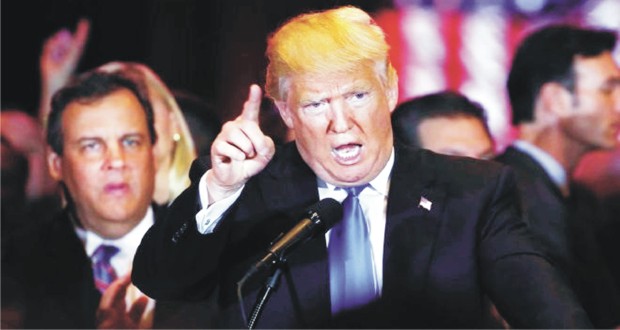Donald Trump has detailed his foreign policy in a speech, a day after sweeping to a win in five US primaries.
Mr. Trump, the frontrunner for the Republican candidacy in the 2016 presidential race, said he would pursue an “America First” policy.
He called the foreign policy of President Barack Obama’s administration “a complete and total disaster”.
On Tuesday, Mr. Trump called himself the Republican “presumptive nominee” after his primary wins.
He claimed victories in Connecticut, Delaware, Rhode Island, Maryland and Pennsylvania.
Before the speech, he promised it would not be a “Trump doctrine”, and that he would retain some flexibility to make changes if elected.
Much of his speech focused on what he called the “weakness, confusion and disarray” of the Obama administration, and his hope of reversing it.
Before the audience in Washington, he vowed to “shake the rust off America’s foreign policy”.
Image copyright Reuters Image caption Mr. Trump previously said he backed stronger interrogation of IS suspects.
Mr. Trump said that, under his administration “their days are numbered – I won’t tell them when, and I won’t tell them how”.
He had previously said he would weaken so-called Islamic State (IS) by cutting off their access to oil, and supported waterboarding and other strong interrogation methods against them. He did not return to these proposals on Wednesday.
“Containing the spread of radical Islam must be a major foreign policy goal of the United States and indeed, the world,” he said on Wednesday, adding that he would work closely with US allies in the Middle East to combat extremism.
On Nato and other powers
New talks would be sought with the United States’ allies in Nato, Mr Trump said, to try and reshape the organisation’s structure and discuss a “rebalancing” of US financing towards it.
Mr. Trump said he would also aim to hold talks with Russia to try and establish common ground, possibly over Islamic extremism.
“Some say the Russians can’t be reasonable,” he said. “I intend to find out.”
China, he said, “respects strength, and by letting them take advantage of us economically like they are doing, we are losing all their respect”. He said he would seek to “fix our relations with China” but did not suggest how.
On US allies
“The countries we defend must pay for the cost of this defence,” he said. “If not, the US must be prepared to let these countries defend themselves. We have no choice.”
Speaking to the New York Times last month about the US-Japan relationship, he said: “If we’re attacked, they do not have to come to our defence, if they’re attacked, we have to come totally to their defence. And that is a, that’s a real problem.”
Mr. Trump once said he was his own best foreign policy adviser, but, in recent months, has expanded his backroom team. Some of his appointments have proved controversial.
The team is led by Republican Senator Jeff Sessions of Alabama who has helped shape Mr. Trump’s policies.
Another member, retired Gen Joseph Schmitz, resigned from the military in 2005 amid accusations of misconduct.
However, Mr. Schmitz was never charged with wrongdoing.
Another adviser, Walid Phares, was criticised when he was named as part of Mitt Romney’s foreign policy team in 2011.
Muslim advocacy groups took issue with Mr Phares’s close ties to right-wing Christian militia groups during the Lebanese civil war.
What do others think of Trump’s ideas?
Before the speech on Wednesday, Aaron David Miller, former adviser to Republican and Democratic administrations, said Mr. Trump’s proposals were “a perfect storm of isolationism, muscular nationalism, with a dash of pragmatism and realism”.
Steve Schmidt, the former campaign manager to 2008 Republican candidate John McCain, told Reuters that Mr. Trump was under pressure “to show that he has the substance, the depth of knowledge and the vision to be the American commander-in-chief”.
After his sweep of the five mid-Atlantic states, Mr. Trump said of the battle for the Republican nomination: “It’s over. As far as I’m concerned, it’s over.”
He told supporters in New York he would not moderate his policies if elected president.
For the Democrats, Hillary Clinton was denied a clean sweep by Bernie Sanders, after he won in Rhode Island.
Mr. Trump said his Democratic rival’s only advantage in the presidential race was being a woman.
“Frankly, if Hillary Clinton were a man, I don’t think she’d get 5% of the vote,” he said.
Mrs Clinton hit back at his accusation that she was playing the “woman card”.
“Well, if fighting for women’s healthcare and paid family leave and equal pay is playing the woman card, then deal me in,” she told cheering supporters in Philadelphia.
Culled from bbcnews

